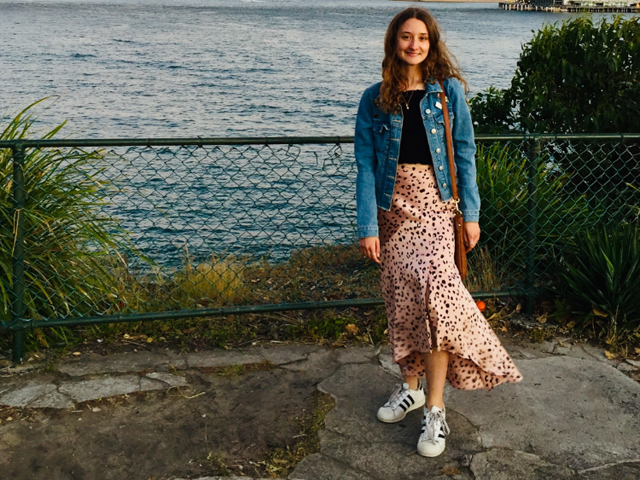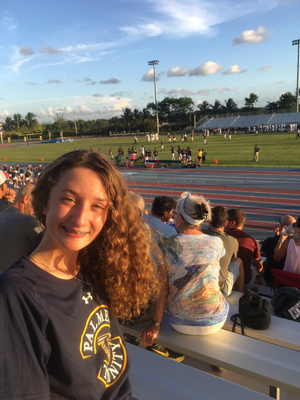Lauren Souter Hearing Health Interview

Teenage Success Story After Facing Hearing Adversity
Hearing Australia is encouraging parents to check their child's hearing health to ensure they have a sound start to school this year. World leading research by the National Acoustic Laboratories (NAL), the research division of Hearing Australia, has established that the earlier a child with hearing loss can be fitted with a hearing aid or cochlear implant, the better the outcomes.
Results from NAL's Longitudinal Outcomes of Children with Hearing Impairment (LOCHI) study show that early fitting of hearing devices is key to achieving better speech, language and psychosocial outcomes for children with hearing loss.
"The results show that children who receive early fitting of hearing devices and early educational intervention have significantly better language outcomes at 5 and 9 years of age, on average, than those whose hearing loss was discovered later," says Dr Teresa Ching, Head of the Communication Sciences Department at NAL.
The third wave of the LOCHI study commenced in 2019 and will run until 2024. It will address the current evidence gaps on the long-term effectiveness and cost-effectiveness of early hearing intervention.
"It's critical for parents to be aware of these findings so that they and their healthcare professionals are prompted to take immediate action if they suspect a child may have a hearing problem," explains Dr Brent Edwards, Director of NAL.
"Children should receive regular hearing checks as they would receive their general health check-ups. It's important that parents understand that hearing health plays a vital role in a child's mental wellbeing and development," says Dr Edwards.
LOCHI Wave III will investigate the effects of early hearing intervention on educational attainment, mental health and quality of life of children with hearing loss at 18 years of age. In addition, it will quantify the economic impact of permanent childhood hearing loss.
The findings will provide important evidence to guide the hearing healthcare roadmap across an individual's lifespan. In addition, the evidence will guide healthcare workers, professionals and policy-makers to support and optimise outcomes for children with hearing loss.
"Hearing Australia cares for the hearing health of some 33,000 children and young adults up to the age of 26," says Mr Kim Terrell, Hearing Australia Managing Director. "We're focused on delivering a number of initiatives aimed at reducing the incidence of preventable childhood hearing loss, which is estimated to be 49%. If parents and families have any concerns or questions about their child's hearing health, we invite them to come and talk to our team of professionals to help ensure better future outcomes for their child."
Call us on 131 797 or pop into one of over 600 Hearing Australia locations nationwide. You can find your local centre by visiting www.hearing.com.au.
Results from NAL's Longitudinal Outcomes of Children with Hearing Impairment (LOCHI) study show that early fitting of hearing devices is key to achieving better speech, language and psychosocial outcomes for children with hearing loss.
"The results show that children who receive early fitting of hearing devices and early educational intervention have significantly better language outcomes at 5 and 9 years of age, on average, than those whose hearing loss was discovered later," says Dr Teresa Ching, Head of the Communication Sciences Department at NAL.
The third wave of the LOCHI study commenced in 2019 and will run until 2024. It will address the current evidence gaps on the long-term effectiveness and cost-effectiveness of early hearing intervention.
"It's critical for parents to be aware of these findings so that they and their healthcare professionals are prompted to take immediate action if they suspect a child may have a hearing problem," explains Dr Brent Edwards, Director of NAL.
"Children should receive regular hearing checks as they would receive their general health check-ups. It's important that parents understand that hearing health plays a vital role in a child's mental wellbeing and development," says Dr Edwards.
LOCHI Wave III will investigate the effects of early hearing intervention on educational attainment, mental health and quality of life of children with hearing loss at 18 years of age. In addition, it will quantify the economic impact of permanent childhood hearing loss.
The findings will provide important evidence to guide the hearing healthcare roadmap across an individual's lifespan. In addition, the evidence will guide healthcare workers, professionals and policy-makers to support and optimise outcomes for children with hearing loss.
"Hearing Australia cares for the hearing health of some 33,000 children and young adults up to the age of 26," says Mr Kim Terrell, Hearing Australia Managing Director. "We're focused on delivering a number of initiatives aimed at reducing the incidence of preventable childhood hearing loss, which is estimated to be 49%. If parents and families have any concerns or questions about their child's hearing health, we invite them to come and talk to our team of professionals to help ensure better future outcomes for their child."
Call us on 131 797 or pop into one of over 600 Hearing Australia locations nationwide. You can find your local centre by visiting www.hearing.com.au.
 Interview with Lauren Souter
Interview with Lauren Souter
Question: Can you share your personal experience with hearing loss?
Lauren Souter: My experience with hearing has been hard, it has had its up and downs but I wouldn't change anything about it. If you had ask me in year 7, I would of wished I was not deaf but now it is a part of who I am that I have accepted and am proud of. It has been hard because I often miss things in a conversation, making social situations difficult, or a classroom discussion, making me work harder to ensure that I have not missed anything.
Question: Do you remember this diagnoses time, when you were in kindergarten?
Lauren Souter: I do not remember the diagnosis time clearly. However, I remember one incident where soon after my mum had discovered I had lost all of my hearing, I was shopping with her, and I looked up at my mum and she was crying. I remember saying to her "when are you going to stop being so sad"? It was sure sign that I would be okay!
Question: How does your hearing loss affect you, now?
Lauren Souter: My hearing loss now, whilst I can hear the majority of what occurs in a conversation, means I still miss words and may develop a misunderstanding, meaning I have to ask questions to have the words/story/information to be repeated. I have struggled in social situations because of this and it can be hard to speak up.
Question: Can you tell us about your cochlear implants?
Lauren Souter: My cochlear implants are simply amazing, they have enabled me to achieve in school, to participate in a variety of activities such as sport and musicals. I believe that there are no limitations on what I can achieve. One of my favourite aspects of my cochlear implants is that, with new technology developing, I can use Bluetooth, meaning I can stream music and phone calls directly to my implants.
Question: How important is it that we encourage early hearing tests in school age children?
Lauren Souter: It is imperative to encourage early hearing tests in school age children, as even a minimal hearing loss can affect a person's understanding of a conversation, especially in classrooms and classroom discussion's, leading to reduced learning outcomes. Hearing Australia have been able to and continue to provide support to me throughout the years, by providing a FM as well as assisting me in any way that they can.
Question: What message do you hope to spread by speaking out about your experience?
Lauren Souter: I hope others will have a better understanding and awareness of hearing loss and the ways in which it can impact a person as well as the importance of getting your hearing checked and seeking assistance as soon as a problem arises.
Question: What's next, for you, this year?
Lauren Souter: This year I am completing the HSC, and I am very excited to be finishing school soon!
I plan at the end of this year to go travelling and hopefully part of this will include an overseas service project before starting university, where I plan to study environmental science
Interview by Brooke Hunter
Lauren Souter: My experience with hearing has been hard, it has had its up and downs but I wouldn't change anything about it. If you had ask me in year 7, I would of wished I was not deaf but now it is a part of who I am that I have accepted and am proud of. It has been hard because I often miss things in a conversation, making social situations difficult, or a classroom discussion, making me work harder to ensure that I have not missed anything.
Question: Do you remember this diagnoses time, when you were in kindergarten?
Lauren Souter: I do not remember the diagnosis time clearly. However, I remember one incident where soon after my mum had discovered I had lost all of my hearing, I was shopping with her, and I looked up at my mum and she was crying. I remember saying to her "when are you going to stop being so sad"? It was sure sign that I would be okay!
Question: How does your hearing loss affect you, now?
Lauren Souter: My hearing loss now, whilst I can hear the majority of what occurs in a conversation, means I still miss words and may develop a misunderstanding, meaning I have to ask questions to have the words/story/information to be repeated. I have struggled in social situations because of this and it can be hard to speak up.
Question: Can you tell us about your cochlear implants?
Lauren Souter: My cochlear implants are simply amazing, they have enabled me to achieve in school, to participate in a variety of activities such as sport and musicals. I believe that there are no limitations on what I can achieve. One of my favourite aspects of my cochlear implants is that, with new technology developing, I can use Bluetooth, meaning I can stream music and phone calls directly to my implants.
Question: How important is it that we encourage early hearing tests in school age children?
Lauren Souter: It is imperative to encourage early hearing tests in school age children, as even a minimal hearing loss can affect a person's understanding of a conversation, especially in classrooms and classroom discussion's, leading to reduced learning outcomes. Hearing Australia have been able to and continue to provide support to me throughout the years, by providing a FM as well as assisting me in any way that they can.
Question: What message do you hope to spread by speaking out about your experience?
Lauren Souter: I hope others will have a better understanding and awareness of hearing loss and the ways in which it can impact a person as well as the importance of getting your hearing checked and seeking assistance as soon as a problem arises.
Question: What's next, for you, this year?
Lauren Souter: This year I am completing the HSC, and I am very excited to be finishing school soon!
I plan at the end of this year to go travelling and hopefully part of this will include an overseas service project before starting university, where I plan to study environmental science
Interview by Brooke Hunter
MORE



